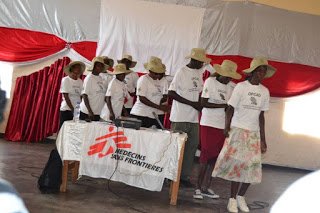 |
| MSF initiated a community programme to improve access to ARVs in Mwenezi |
Cephas Shava
MWENEZI – The Out of Facility
Community Art Distribution (OFCAD), a unique model pioneered by the Medicins
Sans Frontieres (MSF), known in English as Doctors Without Borders, is making drastic
changes in the lives of people living with HIV and Aids.
The project, by which village
health workers are trained and authorised to distribute ARVs right within their
local areas of residence, has made it much easier and more convenient for
patients to access anti-retroviral medication.
“As a volunteer I am
currently responsible for distributing antiretrovirals (ARVs) from right at my
homestead to a total of 37 patients; 21 of them being women. At first, I was in
charge of 15 patients but now they have increased to 37.
“Though the work comes with its
own challenges, I continue to voluntarily do my job with utmost zeal and
passion,” said Tsitsidzashe Marova a 41-year-old OFCAD member from Mutandavaze
village in Mwenezi West Ward 17 under Chief Mazetese.
The model was piloted in Chirindi
and Sovelele which are among the most difficult areas to reach in Ward 17.
MSF, which is an international
medical humanitarian organisation, officially handed over OFCAD to Batanai HIV
and Aids Services Organisation (Bhaso) and the Ministry of Health and Child
Care who are now in charge of the 11 OFCAD sites.
Under the programme, village
health workers are torchbearers in the fight against HIV through their mandate
at OFCAD sites.
People in the beneficiary
communities say the programme is contributing to the significant improvement in
Anti-Retroviral Treatment (ART) client retention in those remote areas.
In other remarks to TellZim News,
Marova said she was gaining more experience and passion in the contact of her
work such that she no longer minded the obstacles.
“I am doing this task
voluntarily without any monthly income. Whenever I run short of drugs at our
OFCAD site, I borrow a bicycle from other villagers and cycle to the nearest
clinic, Chirindi, where I get replenishments. I am glad because I have managed
to register more people for anti-retroviral treatment,” said Marova.
Chirindi Clinic is some 45km away
from Marova’s homestead, meaning she spends the greater part of the day cycling
to and from the clinic should she run out of stock.
The local ward councillor, Simon
Chabata praised the project which he said was contributing a lot of positives
in the fight against HIV and Aids in the area.
“Ward 17 is one of the
remotest places in the district such that before this programme, patients would
travel for about 65km and more to get to the nearest clinic to get their
provisions of ARVs. This saw many people failing to consistently adhere to
their treatment regimes. I am glad, therefore, because OFCAD has brought drugs
closer to those that need them,” said Chabata.
He added that government and the
donor community could find a way of incentivising the village health workers so
that their work becomes easier and enjoyable.
Bhaso director Simbarashe Mahaso said
there was need to create more OFCAD sites in other remote parts of the district
to improve uptake of ARVs among people living with HIV and aids.
“This is a very helpful project
and I think it would be helpful if more centres are created in other needy
places of the district. As Bhaso, we are pleased with our own contribution to this
project through our partnership with the National Aids Council (Nac) which has
enabled us to maintain and service the existing OFCAD sites,” said Mahaso.
Mwenezi District Medical Officer
(DMO) Dr Itai Matibiri said more and more patients were being referred to the OFCAD
sites since the project kicked off.
“The medication received at
these OFCAD sites is distributed by NatPharm (the state-owned pharmaceutical company)
to ensure quality standards. It is pleasing that many patients are being
referred to those OFCAD sites to collect their medication,” said Matibiri.
